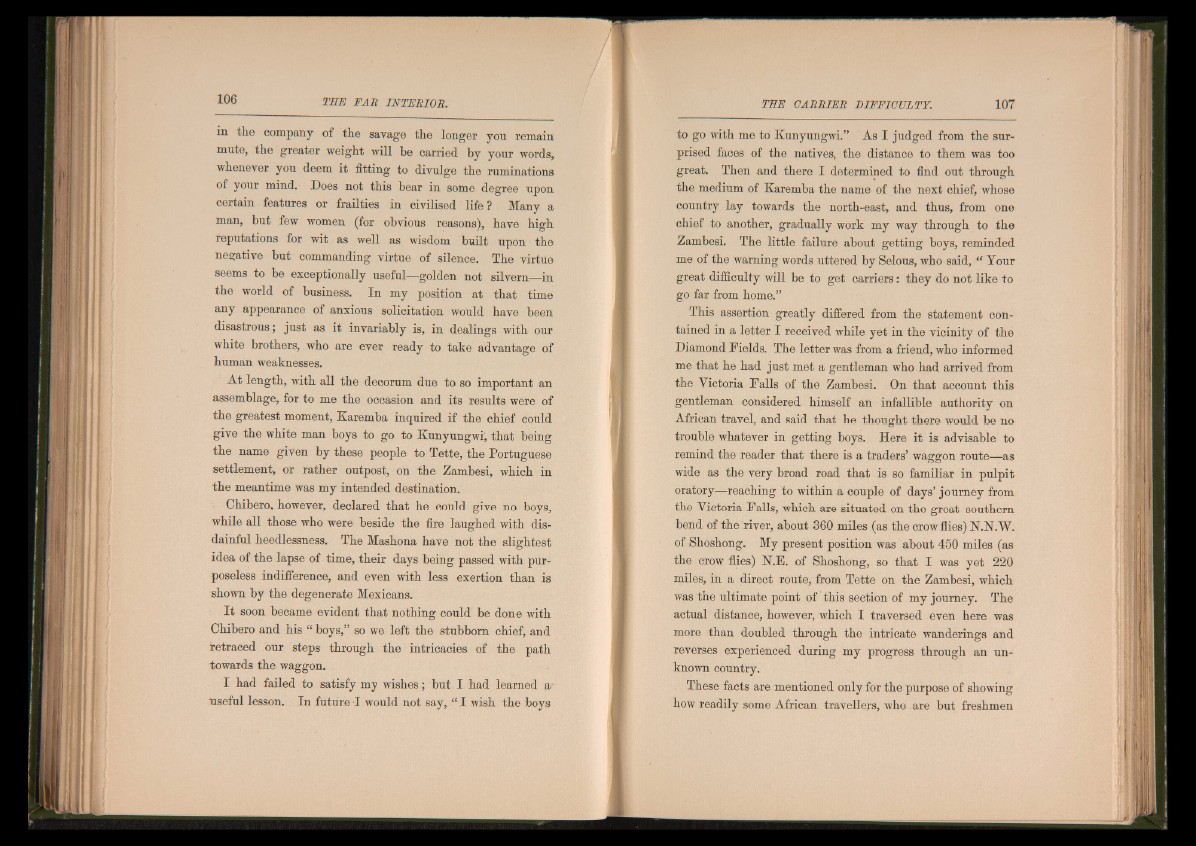
in the company of the savage the longer you remain
mute, the greater weight will be carried by your words,
whenever you deem it fitting to divulge the ruminations
of your mind. Does not this bear in some degree upon
certain features or frailties in civilised life? Many a
man, but few women (for obvious reasons), have high
reputations for wit as well as wisdom built upon the
negative but commanding virtue of silence. The virtue
seems to be exceptionally useful—golden not silvern—in
the world of business. In my position at that time
any appearance of anxious solicitation would have been
disastrous; just as it invariably is, in dealings with our
white brothers, who are ever ready to take advantage of
human weaknesses.
At length, with all the decorum due to so important an
assemblage, for to me the occasion and its results were of
the greatest moment, Karemba inquired if the chief could
give the white man boys to go to Kunyungwi; that being
the name given by these people to Tette, the Portuguese
settlement, or rather outpost, on the Zambesi, which in
the meantime was my intended destination.
Chibero, however, declared that he could give no boys,
while all those who were beside the fire laughed with disdainful
heedlessness. The Mashona have not the slightest
idea of the lapse of time, their days being passed with purposeless
indifference, and even with less exertion than is
shown by the degenerate Mexicans.
I t soon became evident that nothing could be done with
Chibero and his “ boys,” so we left the stubborn chief, and
retraced our steps through the intricacies of the path
towards the waggon.
I had failed to satisfy my wishes; but I had learned a
useful lesson. In future I would not say, “ I wish the boys
to go with me to Kunyungwi.” As I judged from the surprised
faces of the natives, the distance to them was too
great. Then and there I determined to find out through
the medium of Karemba the name of the next chief, whose
country lay towards the north-east, and thus, from one
chief to another, gradually work my way through to the
Zambesi. The little failure about getting boys, reminded
me of the warning words uttered by Selous, who said, “ Your
great difficulty will be to get carriers: they do not like to
go far from home.”
This assertion greatly differed from the statement contained
in a letter I received while yet in the vicinity of the
Diamond Fields. The letter was from a friend, who informed
me that he had just met a gentleman who had arrived from
the Victoria Falls of the Zambesi. On that account this
gentleman considered himself an infallible authority on
African travel, and said that he thought there would be no
trouble whatever in getting boys. Here it is advisable to
remind the reader that there is a traders’ waggon route—as
wide as the very broad road that is so familiar in pulpit
oratory—reaching to within a couple of days’ journey from
the Victoria Falls, which are situated on the great southern
bend of the river, about 360 miles (as the crow flies) N.N.W.
of Shoshong. My present position was about 450 miles (as
the crow flies) N.E. of Shoshong, so that I was yet 220
miles, in a direct route, from Tette on the Zambesi, which
was the ultimate point of this section of my journey. The
actual distance, however, which I traversed even here was
more than doubled through the intricate wanderings and
reverses experienced during my progress through an unknown
country.
These facts are mentioned only for the purpose of showing
how readily some African travellers, who are but freshmen